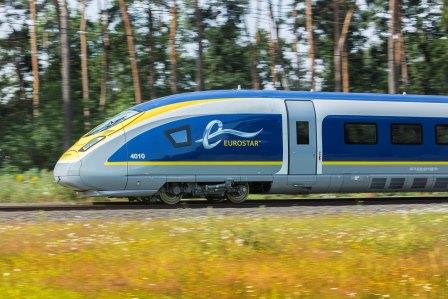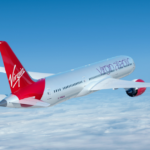
- Merger plans of Eurostar and Thalys for the sake of sustainable travel in Europe have been presented to the boards of shareholders for approval.
- While high-speed passenger train Eurostar directly connects the United Kingdom to France, Belgium and The Netherlands through the Channel Tunnel, Thalys serves Belgium, France, Netherlands and Germany, together operating across five countries.
- By merging, the companies look forward to meeting Europe’s growing demand for eco-responsible and sustainable travel. The combining of the two high-speed rail service could also encourage travellers to switch to train travel from air or road travel, increasing their passenger number from over 18.5 million passengers on an annual basis to nearly 30 million by 2030.
- The Green Speed project could also boost the use of renewable energy to further cut down CO2 emissions, eliminate the use of plastics, encourage eco-driving of trains and sustainable purchasing.
- Guillaume Pepy, Chairman of SNCF (French National Railway Company), said: “The challenge of climate change and the demand for eco-responsible travel calls for an ambitious response. Bringing together the strengths of Eurostar and Thalys would be a powerful response to this challenge.”
PRESS RELEASE
From their earliest days, Eurostar and Thalys have shared the same purpose and vision – to directly connect European cities across borders whilst respecting the environment. Over the last twenty-five years, this has been achieved by revolutionising high-speed rail travel and giving rise to a new generation of environmentally responsible travellers by providing fast and easy direct links between city centres across destinations in Europe.
Thalys and Eurostar operate already across five countries – France, United Kingdom, Belgium, the Netherlands and Germany – with an approximate population of nearly 245 million. Together, they run 112 trains every day serving together more than 18.5 million passengers annually.
The challenge of climate change and Europe’s growing demand for eco-responsible and sustainable travel presents a great opportunity for both companies in terms of development.
The combined excellence and unique expertise of Eurostar’s and Thalys’ colleagues would provide a powerful platform for the future growth of European high-speed rail and a solution to this growing demand.
Going forward, passengers would experience a comfortable, sustainable and European high speed travel experience. By combining Thalys and Eurostar, the Green Speed project would link the UK with the Mediterranean, the North Sea with the Atlantic and the Benelux countries with the peaks of the Alps.
This new service would be an additional reason to choose the train over road or air travel in Europe.
Combining resources – in particular fleets as well as information and distribution systems – would increase economic efficiency and provide the customer with an enhanced, sustainable commercial service, delivering on the ambition to increase the number of direct links between European cities in the future.
All of the colleagues who have made Thalys and Eurostar the success they are today have unique experience of European travellers and their diversity. Tomorrow they would build the Green Speed Project drawing on their collective high speed rail skills.
The vision for the Green Speed Project is underpinned by five key objectives
1. An attractive alternative to air and road travel for nearly 30 million passengers per year by 2030
The combined entity would aim to accelerate the switch from air and road travel to high speed rail travel by increasing the capacity of passengers per year on the combined Eurostar and Thalys networks, both current and future, from 18.5 million passengers today to nearly 30 million by 2030, providing a response to the growing demand for environmentally-responsible travel.
2. A high-speed train service relying on renewable energy and an ambitious sustainability policy
The Green Speed Project would aim to create a combined entity which would maximise the use of renewable energy for its fleet between now and 2030 further reducing its CO2 emissions in support of the EU’s commitment to reducing carbon emissions.
By accelerating the initiatives already in place, the combined entity would also aim to introduce an ambitious environmental policy in terms of waste management, removal of plastics, eco-driving of trains and sustainable purchasing.
3. Simpler international travel for every customer
As a result of combining the two companies, the new entity would provide each customer with seamless and efficient services with one single ticket between the countries and cities on the Thalys and Eurostar networks, improved schedules for quick connections, supported by innovative digital tools at every stage of the journey for customers.
4. Attractive offers and a single passenger loyalty programme
A joint loyalty programme would be introduced across the unified network giving passengers access to attractive travel and partner offers with other multimodal, sustainable companies. The members of this unified loyalty programme would benefit from more upgrades, discounts and complimentary journeys with early access to partner offers as well as lounges and other personalised benefits.
5. A multicultural, warm and friendly service
Drawing on both companies’ culture of quality and hospitality, the proposed combination would aim for excellence in terms of service quality for its customers.
Guillaume Pepy, Chairman of SNCF, said: “The challenge of climate change and the demand for eco-responsible travel calls for an ambitious response. Bringing together the strengths of Eurostar and Thalys would be a powerful response to this challenge. The creation of a combined European high speed rail company would deliver a compelling alternative to road and air travel for our 18.5 million passengers and would herald a new era in the development of European high speed rail services. High speed is an opportunity for Europe, Europe an opportunity for high speed!”
Sophie Dutordoir, CEO of SNCB and Chairman of Thalys said:
“Thalys and Eurostar joining forces would come at the right time and could only be beneficial to all travellers. It would combine railway expertise with stable shareholders. The combination would be based on the strong conviction that, now more than ever, the train is the safest, most sustainable, fastest and most efficient solution for travelling inside Europe. Brussels would play a central role in this project as the hub for the various routes, linking all the cities that are served”.
Emmanuel Jaclot, CDPQ’s Executive Vice-President and Head of Infrastructure, on behalf of Patina Rail LLP*, said:
“The creation of this major public transport platform would mark a milestone in European sustainable mobility. As part of our global infrastructure portfolio, we are very proud to continue our longstanding partnership with SNCF, to support the development of our portfolio company Eurostar, and to participate in shaping the growth of environmentally responsible modes of transport across Europe.”
*Patina Rail LLP, shareholder of Eurostar alongside SNCF and SNCB, is owned by a consortium of the Caisse de depôt et placement du Québec (‘CDPQ’) and funds managed or advised by Hermes GPE LLP (‘Hermes Infrastructure’). Hermes GPE LLP is a joint venture between Hermes Fund Managers Limited, GPE Partner Limited and HGPE Capital Limited.




